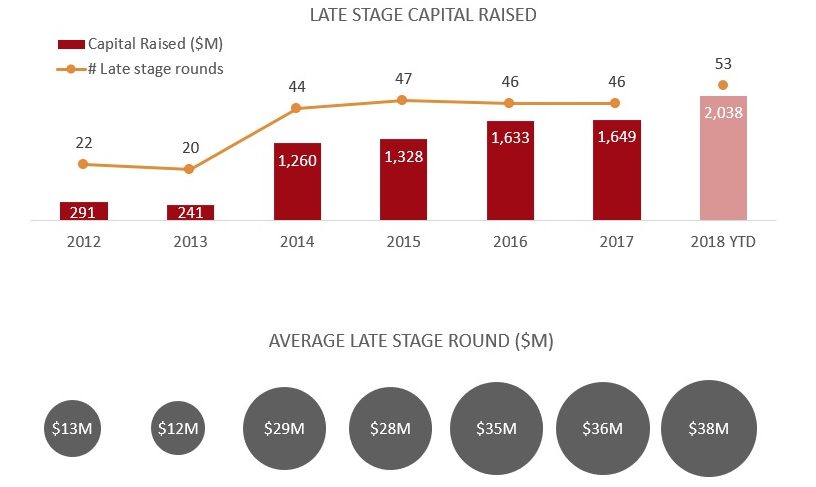The end of the year is a good time for reflection, to look back at what we had accomplished and to look forward to what we can expect next year. Personally, I pause to reflect on what it is that led to the evolution of Israeli late stage companies. Israel has always been characterized by a high level of innovation, incredible technology and great tech teams. It was a nation that produced thousands of cool new startups, but when it came to scaling the business through building strong and global Sales and Marketing teams, it was a challenge few companies had managed to overcome.
But that has changed big time. Over the past couple of years, fundamental changes in business models have opened a wider window of opportunities for Israelis to excel. Coupled with a change in the founder profile, larger companies began to emerge.
In the past, Israeli B2B companies, mainly software companies, struggled with developing their Sales and Marketing teams, especially when compared with American companies. Recruiting top talent Sales & Marketing leadership in the US, proved difficult while competing against America’s leading VCs and tech companies. Even when talent could be pulled in, cultural differences made it difficult to keep them on board. In addition, Israeli leadership employed a more conservative and results-oriented philosophy. Budgets were approved step by step and short-term measurements were key to increasing expenses, whereas the American tendency was more long term, high risk, raise larger amounts of money, go “all in” and spend aggressively from earlier stages. If a typical American company would invest above 50% of revenues in Sales and Marketing, the typical Israeli company would stop short at 25%. This approach was both culturally driven, but also a result of the lack of late stage funding available to Israeli startups, while their US counterparts had late stage funding available in abundance.
Fast forward to the present, new business models such as SaaS have eliminated some of the barriers for Israeli companies. Many of the successful SaaS companies have a significant portion of their revenues deriving from inbound teams with relatively low touch with customers. This model does not require an army of expensive, highly trained travelling sales managers – resulting in low cost and efficient Sales teams. On the Marketing side, the CMO role has dramatically changed as have the available marketing tools. Today’s CMO needs deep data diving abilities and KPI tracking and analysis skills. A large portion of marketing now is taking place online and companies can successfully reach their target audience for a fraction of the cost using big data and analytics — areas where Israelis have traditionally thrived.
Suddenly talent became local, not just in R&D but in Marketing and Sales too.
 *source IVC
*source IVC
Today’s market is fortunate to include a rise in mature, serial entrepreneurs who in the past have successfully built and sold companies. These leaders have the passion, patience, drive and amazing execution abilities to build larger, more sustainable businesses, employing hundreds of employees and generating revenues that exceed $100M. These leaders were scarce a decade ago, as were the liquidity options, now being offered by supportive investors. More and more we are seeing that a part of the investment in late stage rounds, includes a secondary portion that enables founders to “meet money” and delay thoughts of a possible early exit. At Qumra, we are supportive of this development which provides founders with flexibility to focus on business growth.
There is also a sharp increase in growth capital available to Israeli companies. When we founded Qumra in 2014, the amount of money invested in Israeli growth companies was approx. $300M a year. In 2017 that value peaked at $1.6B. While this amount is impressive, it’s still below the percentage of late-stage investments allocated to US companies. Today’s market includes 30+ private Israeli companies that have raised >$100M, have 200+ employees, revenues exceed $20M, which are still growing rapidly and are poised to reach meaningful IPOs and M&As.
Not too long ago, billion-dollar valuations were unheard of among privately held Israeli tech companies. Successful companies such as JFrog would have been acquired before ever reaching unicorn status. But today more Israeli companies are joining this category, remaining private and flexible, growing above 60% YoY and making acquisitions along the way. Taboola, Payoneer, and Infinidat are a few examples.
As a Venture Capital investor, active in the Israeli market for over two decades, I feel privileged to have participated in different stages of a tech company’s lifespan and am proud to see this market achieve maturity. We are in the midst of exciting times of value creation in the Israeli market, a trend I expect to continue and gain momentum in the next years. The best is yet to come and next year is shaping up to be even more exciting than the current year. There is a lot to look forward to in 2019.

Really interesting read Boaz!